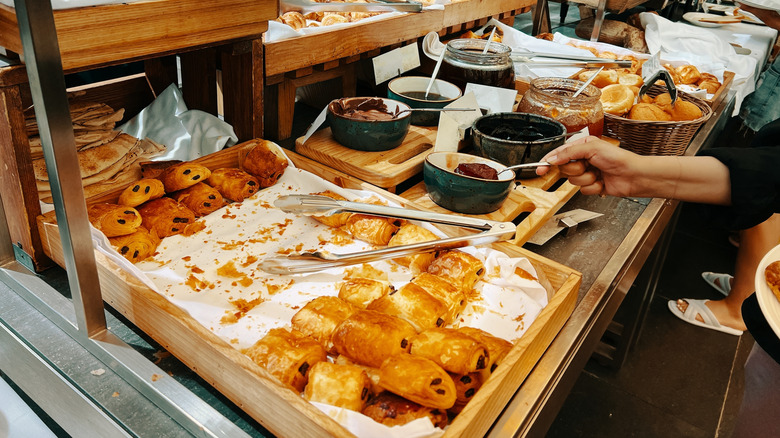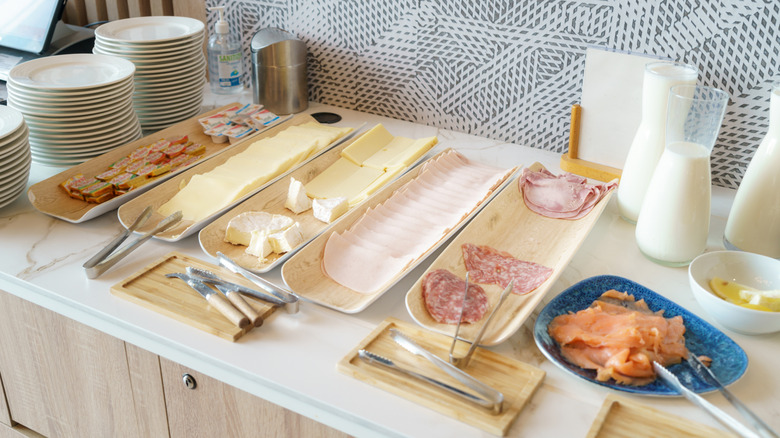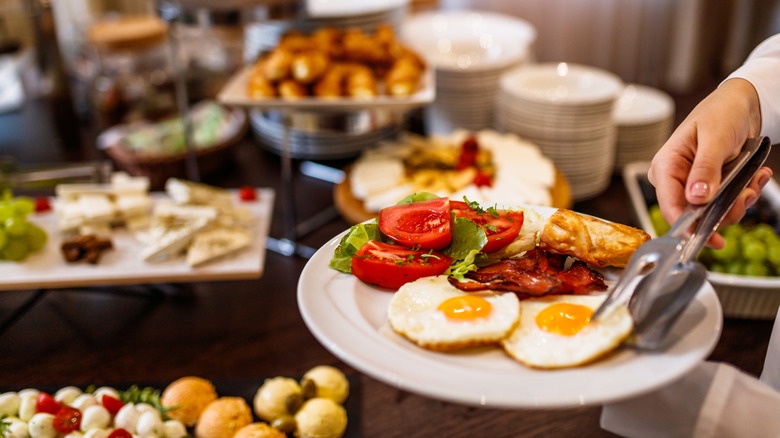The Unsettling Reasons You Might Want To Avoid Hotel Breakfasts While Traveling
Hotel freebies are great — from complimentary toiletries to welcome drinks and free use of amenities, it's the little touches and conveniences that often justify splurging a little extra on a hotel stay. The breakfast buffet is another quintessential hotel add-on, with most medium- to large-sized properties offering some kind of morning meal that's either complimentary or can be accessed for an additional charge. Many guests consider it an important aspect of their stay, and well-run hotels put significant effort into their breakfast buffet. Unfortunately, many properties don't, especially when the breakfast is included in the room tariff. A carelessly managed breakfast buffet can be a lot worse than just cold eggs and soggy toast. Breakfast staples like eggs and milk, if kept at room temperature for prolonged periods, can become breeding grounds for harmful bacteria and pathogens.
In a TikTok video, hotel veteran Brandi Augustus, who worked in the industry for almost 15 years, draws attention to dismal hygiene standards that many hotels have in their breakfast buffets. She recommends staying away from hot breakfast items like eggs and waffles, saying that hotels will cut corners in order to reduce waste and keep expenses low, which sometimes increases the risk of there being stale food on the buffet. To be fair, not all hotels are like this, and Augustus recommends staying in a hotel chain that has a chef — someone who is actively overseeing the food being served. Ultimately, a careless breakfast buffet is one of the biggest red flags of a bad hotel, so try to get some insight on the state of its breakfast offerings the next time you book a hotel.
Red flags to watch out for at the hotel breakfast buffet
Because breakfast preferences vary widely, some hotels try to cover all their bases and have a huge spread that extends past continental breakfast staples like bread, eggs, fruit juices, and pastries. However, one of the reasons a continental breakfast is so popular is that it's easy to prep and replenish, and contains elements that have relatively longer shelf lives. Therefore, a larger spread doesn't necessarily mean a better breakfast. In fact, there is a higher chance that a breakfast spread with lots of food contains items that may have been left out for too long, beyond the time when the food was at its best. Cold cuts, salads, and dishes that contain dairy are particularly susceptible to spoilage.
Be wary of egg dishes in particular, since many hotel chains use powdered eggs, which contain additives and preservatives. If you find the scrambled eggs feeling particularly dry and missing large, fluffy curds, chances are they're made with powdered eggs. Breakfast items packaged in plastic wrapping, like muffins, power bars, or cereal, are also likely to contain preservatives and unhealthy fats.
Finally, check how the buffet's food is being handled by the hotel staff as well as by other guests. Considering the food is on display for an extended period with multiple people having access to it, make sure that the buffet is set up in a way that minimizes contamination and that you don't pick up a piece of food that someone else has already handled. Reach for boiled eggs and bananas, since you peel them yourself before eating. Eggs to order are also a good option, since they are usually freshly made.
When to opt for the hotel breakfast buffet
While hotel breakfasts can have several red flags, once you learn to spot and navigate these pitfalls, there can be benefits to opting for the buffets at certain hotels. A large percentage of hotel guests factor in the quality of breakfast when making their booking decision, so hotels are stepping up their breakfast game, and some hospitality brands are even making it their USP (Unique Selling Proposition). When traveling internationally, there are certain destinations where the chances of getting a great hotel breakfast are higher. A lot of hotels in Southeast Asia have well-managed breakfast spreads that resemble a feast. High-end hotels tend to be cheaper in tropical countries that have a developed tourist market but where the cost of living (including food costs) is lower. Thus, staying in a fancy hotel there is a lot cheaper than in the States, and the included breakfast will often be a lot better. Travel guru Rick Steves also recommends Scandinavia for serving some of Europe's biggest breakfast buffets.
Having breakfast included in your hotel stay can sometimes save you significant hassle and money. If your hotel offers a good breakfast, fill up on it before stepping out for the day, and you won't have to spend as much on lunch at a restaurant. Exploring local cuisine aside, sometimes it's nice to get some familiar food at the start of the day, especially when visiting a new country. And one of Rick Steves' crucial tips for vegetarians traveling to Europe is to fill up on the hotel breakfast, since the breakfast buffet usually has a variety of vegetarian options.


